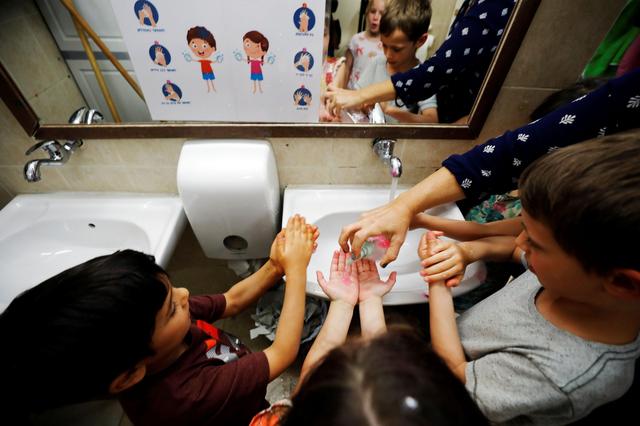COVID-19 in children: do antibodies last less after infection than in adults?
As the disease COVID-19 is a new infection in the world, every day there are different findings about the coronavirus that causes it and its impact on different populations. Children of all ages can get sick. But most usually don't get as seriously ill as adults, and some may not have any symptoms at all. But how long does the immune system response to coronavirus infection last in children? A study carried out in Israel suggests that the antibodies generated after infection by the coronavirus would last less than that of adults.
Researchers at the Shaare Zedek Medical Center, in Israel, found that up to a third of children in Jerusalem have likely been infected with the coronavirus. In a newly published report by the same hospital it was shown that the neutralizing antibodies of young people who contract the virus begin to wane after as little as four months.
A team of doctors from Shaare Zedek, led by Professor Yechiel Schlesinger, recently completed a study, the first of its kind, in the hospital's pediatric ward, in collaboration with the Ministry of Health, which showed the prevalence of antibodies against the coronavirus among children who went to the emergency room for treatment. According to Schlesinger, "they can be used when making political decisions for the country."
The study was published in the specialized journal Acta Paediatrica. Researchers examined 1,138 children under the age of 18, with a mean age of 4.4 years, between October 18, 2020, and January 12, 2021. They found that among children who had tested positive for coronavirus during that period, nearly a third (29%) had no neutralizing antibodies.
“A third were tested up to three weeks after illness onset and appeared to have not yet developed antibodies,” Schlesinger explained. But the other two-thirds had contracted the disease more than four months earlier, and their antibodies appear to have declined.

The study showed that children studied in Jerusalem reach a peak level of antibodies up to three months after diagnosis. "Subsequently, a significant quantitative decrease in antibodies was observed, more than in adults. These results may indicate that children have a weaker long-term immune response," said the researcher.
According to Schlesinger, the disappearance of the antibodies does not mean that these children are not protected, but "it makes us wonder about their protection," he said. Especially since other studies have shown that the probability of infection is greater as antibody levels decrease. The study could also have important implications for understanding herd immunity, for the possibility of a repeat wave of reinfection, and for vaccine considerations for children.
Consulted by Infobae, virology researcher Rosa Bologna, from the Juan Garrahan Pediatric Hospital in Argentina and the Argentine Pediatric Society, commented that there are several studies in boys on the duration of immunity after coronavirus infection. “The duration could be related to the differences in the clinical presentation of the disease. It could also vary depending on the age of the children,” said Dr. Bologna.
Meanwhile, Enrique Casanueva, head of the pediatric infectious disease service at Hospital Universitario Austral in Pilar, Argentina, considered that they would be needed for studies that also investigate cellular immunity after infection in children. “Just because they don't have detectable humoral antibody levels doesn't mean they don't have immunity. This has already been observed in pediatrics with the hepatitis B vaccine and children in American Samoa”, Dr. Casanueva told Infobae.
Another finding from the Israel study was that they found that 10% of the children had had the virus, although 41% of them had some known exposure and knew they had been sick. Schlesinger said the hospital has continued the study. In subsequent work done in June and July 2021, which is being written but not yet published, he found that the percentage of children in Jerusalem who had the virus has skyrocketed from 10% to 30% or even slightly higher.
The Health and Education ministries began a series of serological tests on Monday among students in Haredi neighborhoods to determine the percentage of children who might have had the coronavirus. Ministries have suggested that they expect 25-30% to have been infected. Children who do have antibodies will receive a green pass and be exempt from isolation if a member of their class becomes ill.
“When children came in and knew they had the disease, we would ask them if they knew how they had been exposed,” Schlesinger explained. "Only 10% thought they had been infected at school." He stressed that the children who participated in the study were children who came to the ER and not for COVID, but for other reasons, whether it was pneumonia, a broken toe or appendicitis.
However, another study in Italy has suggested that the duration of antibody levels could be longer in children. The study was led by Dr. Francesco Bonfante in Padua, Italy, and reported that pre-school children (under 6 years of age) with asymptomatic or mildly symptomatic coronavirus infection have high levels of neutralizing antibodies. It suggested that antibody levels remain elevated for the duration of their 7-8 month follow-up period. In contrast, lower neutralizing antibody levels and more transient responses were observed in school-age children and adults.
CONTINUE READING:

